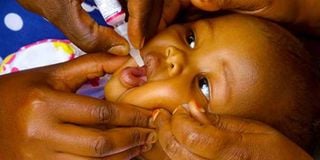State faces suit over ‘unsafe vaccines’ test

A child gets vaccinated during the national launch of the polio vaccination campaign in Gilgil, Nakuru County, on August 1, 2015. A company hired to test the safety of the vaccine has accused the government of reneging on the contract after disagreeing with the findings. PHOTO | SULEIMAN MBATIAH | NATION MEDIA GROUP
What you need to know:
According to the letter, the samples of the vaccines tested were found to have been contaminated.
The letter also says that even after paying Sh5.7 million, the Ministry of Health failed to pick up final results of the tetanus vaccine analysis it had jointly asked for with the Catholic Church.
In 2014, there was a heated debate over the two vaccines between the ministry and the Catholic Church, which claimed that the vaccines were laced with a hormone said to cause infertility in women.
A Nairobi company has threatened to sue the government for failing to pay Sh13.8 million for tests on the controversial tetanus and polio vaccines.
In a demand letter by Gitobu Imanyara Advocates, the company, Agriq Quest Ltd, claims that the government declined to pay for the laboratory tests because it wanted the results altered to show that the vaccines were fit to be administered to women and children.
According to the letter, the samples of the vaccines tested were found to have been contaminated.
The letter also says that even after paying Sh5.7 million, the Ministry of Health failed to pick up final results of the tetanus vaccine analysis it had jointly asked for with the Catholic Church.
“Owing to the shocking findings of contamination of the vaccines, our client was orally advised to alter the results to indicate that they were safe to be administered,” reads the letter dated May 16, but which was obtained by the Nation on Thursday.
In 2014, there was a heated debate over the two vaccines between the ministry and the Catholic Church, which claimed that the vaccines were laced with a hormone said to cause infertility in women.
According to the Catholic Health Commission, the polio vaccine was laced with a hormone that, if injected in children, would affect their growth and reproduction abilities, while the tetanus jab had HCG, a hormone that they claimed could cause infertility in women.
The controversy culminated in the formation of a joint committee of experts from the government and the church which was co-chaired by Prof Fredrick Were from the ministry and Dr Stephen Karanja, representing the church.
According to the letter, the joint committee hired Agriq Quest Ltd to test the vaccines and on December 10, 2015, the laboratory proceeded to test the tetanus vaccine. According to the letter, the final report showing results of the analysis was to be presented to the Catholic Health Commission without any representation from the ministry because “the Ministry of Health was not keen on receiving the laboratory report”.
In April 2015, the letter indicates, the then Director of Medical Services, Dr Nicholas Muraguri, submitted 56 samples of the polio vaccine to be used in the national campaign scheduled for April and May but which was pushed forward to August of the same year after the church raised concerns about the safety of the vaccine.
“Our client responded by sending a budget quotation to the office of the DMS on the same day. Our client thereafter received a verbal communication by way of a telephone call from the office of the DMS asking that they should proceed with the analysis and release the results soonest.”
FULLY SETTLED
However, efforts to reach Dr Muraguri — who is now the Principal Secretary for Health — were futile as he did not respond to texts or calls by the time of going to press on Thursday.
The Nation could also not reach a representative of the Catholic Church.
The letter says: “Owing to our client’s refusal to comply with the oral directive that they indicate that the vaccines were safe, the Pharmacy and Poisons Board authored a letter informing that they were only entitled to charge a maximum of Sh600,000 for the work, yet the fact is that the previous invoice of Sh5.7 million had been fully settled.”




